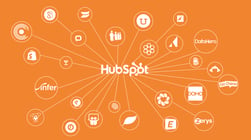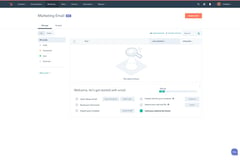ERP software: Features and implementation for your business
Index Content
The success of a company depends to a large extent on the tools that the business uses to carry out its activities. Without the right tools, such as an ERP or enterprise resource planning system, the performance of the business can be greatly affected.
Knowing the characteristics of this integrated management system is essential to correctly and effectively coordinate the different departments and processes of the business, as one of its main functions is to ensure the smooth running of a company.
The choice and implementation of an ERP software in an organisation is not a simple task, as several questions arise as to what should be prioritised or what is the best option: should you opt for the cheapest, most complete or most intuitive solution?
Today we tell you what features an ideal ERP should have and how to implement it in your business.
what is an ERP?
Enterprise resource planning (ERP) refers to a type of software that organisations use to manage day-to-day business activities such as accounting, procurement, project management, risk management and compliance, and supply chain operations. A complete ERP package also includes enterprise performance management, software that helps plan, budget, forecast and report on an organisation's financial performance.
ERP systems unite a multitude of business processes and enable the flow of data between them. By collecting an organisation's shared transactional data from multiple sources, ERP systems eliminate data duplication and provide data integrity with a single source of truth.
Today, ERP systems are critical to the management of thousands of businesses of all sizes and industries. For these businesses, ERP is as indispensable as the electricity that keeps the lights on.
Key features of an ERP
Here are the key features that an ERP system should have. You need to consider carefully what an ERP system can offer and which features are right for your business needs.
-
Integration
ERP systems can integrate with other business systems to provide a complete software system for everything a business does. Arguably the most beneficial element of ERP solutions is that they bring together financial, operational and business data in one place so you can see how all your business areas are working together. You can also connect data from all these areas to get better visibility of what's working and what's not, and correct it based on clear, real numbers.
-
Automation
Another major benefit of a robust ERP system is the ability to automate different operations within a company. Repetitive business tasks such as payroll, order processing, invoicing, reporting, etc. no longer require manual data entry. By automating these tasks, employees can focus on higher impact work. It also reduces the human error that inevitably comes with manual data entry.
-
Accounting
ERP systems with accounting functions have the ability to track, store and analyse financial data such as accounts payable, accounts receivable, forecasting and budgeting. Some systems can also handle more advanced tasks such as tax management, fixed asset management, revenue recognition and multi-currency reconciliation. An ERP solution streamlines these tasks, reducing the time required to close monthly financial statements.
-
Order processing
ERP systems can significantly streamline order processing. On the one hand, an ERP system helps automate order capture by eliminating manual data entry and paper-based routing. On the other hand, it facilitates faster order processing by bringing together departments such as sales, customer service and finance to move orders through the virtual value chain. Automating the value chain saves time and speeds order output, which satisfies customers.
-
Customer Relationship Management (CRM)
To make customers happier, ERP solutions can enhance CRM by collecting all customer information, such as contacts, order history, purchase orders, prospect status, etc., in one easy-to-access, shared place. Staff across the enterprise can monitor how customer needs are being met and receive notifications to intervene at different points in the chain.
-
Data services
Most ERP systems can collect, track and analyse data on all aspects of a company's operations. By tracking key business metrics and generating reports with real-time information, managers can correct course more quickly and make more informed decisions. Reports can show trends and patterns that identify strengths and weaknesses in operations.
-
Supply chain management
One of the most powerful features of ERP systems is the ability to optimise supply chain management. An automated, integrated supply chain will establish purchase orders, work orders and transfer orders between locations. Real-time supply chain data helps identify areas of inefficiency so companies can control inventory, logistics, distribution and manufacturing processes.
-
Manufacturing
ERP solutions can streamline manufacturing processes by helping with operations such as product planning, raw material sourcing, production monitoring and forecasting. You can also select modules to help with assembly management, work order management, shop floor control, distribution planning, product tracking and more. Inventory and forecasting decisions can be simplified and automated.
The business value of ERP
It is impossible to ignore the impact of ERP in today's business world. By integrating business data and processes into ERP systems, companies can align separate departments and improve workflows, resulting in significant cost savings. Examples of its business benefits include the following:
- Improved business insight through real-time information generated by reporting.
- Reduced operationalcosts through streamlined business processes and best practices.
- Increased collaboration through users sharing data on contracts, requisitions and purchase orders.
- Improved efficiency through a common user experience across many business functions and well-defined business processes.
- Consistent infrastructure from back office to front office, with all business activities having the same look and feel.
- Increased useradoption rates through a common experience and design.
- Reduced risk through improved data integrity and financial controls.
- Lower operational and managementcosts through consistent and integrated systems.
Implementing ERP software in your business
There are many different types of ERP, and deciding which one is best for your business can be difficult, so when making your decision, keep in mind that ERP selection should be linked to achieving a number of key objectives:
- Optimising all resources and business processes
- Sharing information among the components of the organisation
- Eliminate unnecessary activities and costs
Once you have made your decision, you just have to get down to work.
what are you waiting for?





